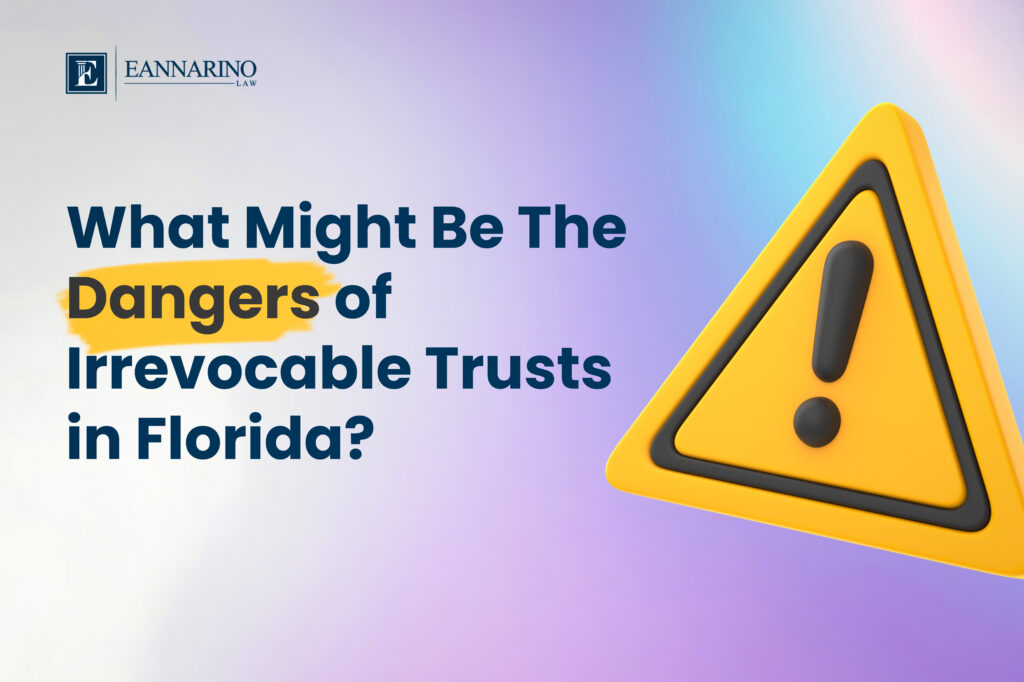
Irrevocable trusts are a popular tool in estate planning, but it’s crucial to understand the dangers of irrevocable trusts before you commit. Many people assume they’re just for the super-wealthy, but that’s not always the case. Sometimes, what seems like a good idea to protect your assets can actually backfire.
So, are irrevocable trusts a bad idea? Not necessarily, but it depends. It’s about weighing the benefits of irrevocable trusts against the potential drawbacks, which could have significant implications for you and your heirs.
Understanding Irrevocable Trusts
An irrevocable trust is a legal entity you create during your lifetime to hold and manage assets. Here’s the catch: once assets are transferred into an irrevocable trust, you generally can’t take them back out. This is unlike a revocable trust, where you maintain more control. This fundamental difference underscores the dangers of irrevocable trusts, especially for those who might need access to their assets in the future.
Benefits of Irrevocable Trusts
Why would anyone give up control of their assets? People create irrevocable trusts for several reasons. Some key benefits include:
Asset Protection: Placing assets in an irrevocable trust shields those assets from creditors, lawsuits, and potential claims, offering a level of protection that a will can’t match. However, the flip side reveals the dangers of irrevocable trusts when considering the lack of control over these protected assets.
Estate Tax Reduction: Irrevocable trusts can help reduce estate taxes. By placing assets in a trust, they may be excluded from your taxable estate, leading to potential tax savings for your heirs. But remember, this tax benefit can come with the dangers of irrevocable trusts if your financial situation changes.
Medicaid Planning: These trusts can help individuals qualify for Medicaid benefits to cover long-term care costs, as assets held within the trust may not be considered when determining eligibility. Despite this advantage, the dangers of irrevocable trusts in Medicaid planning include potential penalties and ineligibility if not set up correctly.
The Flip Side: Dangers of Irrevocable Trusts
While those benefits might sound appealing, the decision to use an irrevocable trust is a big one and shouldn’t be made lightly. Here’s where the dangers of irrevocable trusts come into play:
Loss of Control: The Biggest Drawback When you create an irrevocable trust, you’re essentially saying goodbye to direct control over those assets. This lack of flexibility is a significant factor to consider. What if your financial circumstances change? Too bad, you can’t access those funds. This is one of the primary dangers of irrevocable trusts, as it can severely limit your financial options.
Choosing a Trustee Choosing a trustee is like choosing someone to manage your finances even after you’re gone, making this choice critical. The trustee has a fiduciary duty to act in the best interests of the beneficiaries and manage the trust assets responsibly. However, one of the dangers of irrevocable trusts is the risk of mismanagement if the trustee does not act as expected.
The Trouble with Texas Laws Let’s dive into specifics about how Texas trust laws impact irrevocable trusts, making those dangers very real. Understanding how these laws intersect with your trust is vital. I always recommend talking with an experienced estate planning attorney, especially if you reside in Texas, to mitigate the dangers of irrevocable trusts.
Spendthrift Provisions Texas allows “spendthrift provisions” in irrevocable trusts. These provisions limit a beneficiary’s ability to spend or give away their inheritance. This might seem counterintuitive, but think about it — it adds a layer of protection against creditors and can be a valuable tool for asset protection. Without a spendthrift provision, one of the dangers of irrevocable trusts is that if your beneficiary is sued, their creditors might be able to go after assets in the trust.
Discretionary Distributions and Trustee’s Powers Texas law includes what’s called a “discretionary distribution provision”. This means a trustee has the authority to decide how assets within a trust are distributed, as long as they’re acting “in good faith.” This “good faith” is a critical legal term. Imagine you wanted a specific asset to be used for your child’s education. However, the trustee decided to use those assets differently. Without clearly-defined terms in the trust document, your wishes might not be carried out the way you’d envisioned, highlighting another danger of irrevocable trusts.
Community Property Laws Texas is a community property state. If you’re married, it’s essential to understand that assets you acquired during your marriage generally belong to both you and your spouse. Creating an irrevocable trust in Texas without considering community property rules can have significant consequences, potentially putting assets meant for your children at risk. This is one of the many dangers of irrevocable trusts, as improper planning can disrupt your estate intentions.
Medicaid Eligibility and The Look-Back Period Trying to qualify for Medicaid to cover long-term care expenses? You’ll need to meet certain asset limits. Transferring assets into an irrevocable trust might seem like a way around this, but it’s not that simple. Medicaid has something called a “look-back period,” and it’s something Texas residents should pay attention to. The look-back period can impact your eligibility for government benefits, including Medicaid, illustrating another danger of irrevocable trusts.
Alternatives: What are your Options?
Because there are risks associated with irrevocable trusts, consider alternatives:
Revocable Trusts You remain in control, which eliminates that sense of permanence that might make you uneasy with irrevocable trusts. This flexibility can mitigate the dangers of irrevocable trusts by allowing you to adapt your estate plan as needed.
Strategic Gifting Giving gifts strategically during your lifetime can be a tax-efficient way to reduce the size of your estate over time, potentially reducing your estate tax liability. This approach can help avoid some of the dangers of irrevocable trusts.
FAQs about Dangers of Irrevocable Trusts
What is the best way to leave money to your children? The best way varies from family to family. Consider all of your choices and what’s best for you and your family. That’s where an estate planning attorney comes in, guiding you toward solutions like wills or revocable trusts, depending on your circumstances.
What is the primary disadvantage of an irrevocable trust? The primary downside is giving up control. It’s hard to change after creation and limits your flexibility to access or manage the assets held within the trust. This lack of flexibility is one of the key dangers of irrevocable trusts.
What assets should not be in an irrevocable trust? Assets you might need in the future are usually a bad idea, like your primary home. A financial advisor can guide you on this and help determine the most appropriate assets to include in an irrevocable trust, helping you avoid the dangers of irrevocable trusts.
Conclusion
Don’t let the word “dangers” scare you away from estate planning tools, such as irrevocable trusts. The most crucial takeaway is to approach irrevocable trusts with eyes wide open. Carefully weigh the pros and cons. Speak to an attorney to determine whether those dangers of irrevocable trusts outweigh the benefits in your specific situation.



